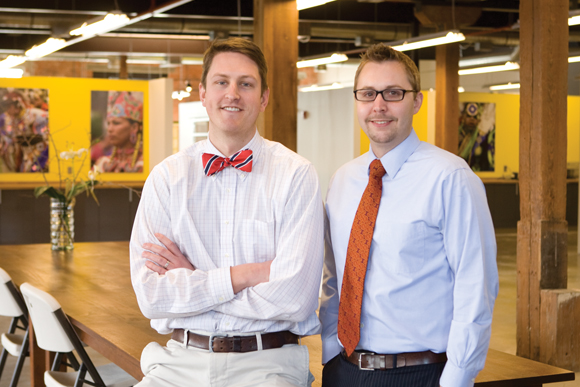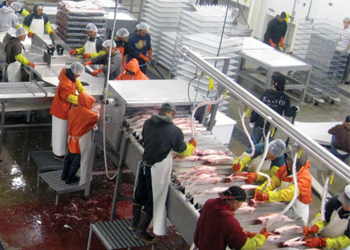by Pat McSparin // Spring 2010

In 21st century America, the idea of a community of 400 families living without electricity sounds impossible. But that was the situation in the Navajo Nation until Bloch School graduates Phil Glynn (M.P.A. ’07) and Chris Vukas (M.P.A. ’08) of Travois New Markets stepped in to help. Located in downtown Kansas City, Mo., Travois New Markets is the certified Community Development Entity (CDE) arm of Travois, a leading American Indian housing and economic development financing firm. Founded by David Bland in 1995, Travois has found a niche working with American Indian communities.
Since its founding, Travois has helped 50 tribes from coast to coast secure $400 million worth of housing and economic investments. In 2009, Travois New Markets received an $80 million allocation of New Markets Tax Credits, a U.S. Treasury program to spur private sector investment in distressed communities by providing a tax credit in return for qualified equity investments.
As a CDE, Travois New Markets uses equity investments to arrange financing for qualified low-income community businesses. “If you develop affordable housing, you get low-income tax credits. If you rehab a historic hotel, you get historic tax credits,” explains Glynn, who serves as Travois New Markets director. “New Markets is the same basic principal. But our investors don’t actually get any tax credits for putting money into projects, they get tax credits for making equity investments into our company.”
“With these projects, larger companies are able to invest and take advantage of these and invest in low-income communities that just didn’t have access to equity before,” says CDE manager Vukas. “We only fund projects that benefit directly tribal lands or are being built to serve or help tribal clients in urban areas. We’re looking for projects that facilitate economic development, from manufacturing projects that produce well-paying jobs to construction projects that provide and create the necessary infrastructures for rural communities.”
The Navajo Nation has benefited from Travois New Market’s commitment. Home to about 175,000 people, the Navajo Nation covers approximately 27,000 miles. Development to serve that population was being hampered by a lack of infrastructure problems, including electrical service. “They had two electrical substations and one of them was 45 years old,” Vukas says. “They had a number of new developments that were supposed to go in—a women’s shelter, an adult treatment center, schools, apartment complexes. But they didn’t have the electrical capacity for these new installations.”
The Navajo Tribal Utility Authority used a $6.4 million New Markets Tax Credit investment through Travois New Markets to build and repair the substations without raising customers’ rates. “We funded these two substations, and they’re going to be able to expand,” Vukas says. “There are other businesses that they’ll be able to import, and there will be 400 homes connected to the grid. That’s 400 families that didn’t have electricity.”

The project’s success earned Travois New Markets and the Navajo Tribal Utility Authority the Community Development Award from the Novogradac Community Development Foundation. The award is given annually to honor community development programs and organizations that “establish positive change in the nation’s communities.”
The success Glynn and Vukas have built together didn’t begin at Travois New Markets—it began at the UMKC Bloch School. “Chris and I met at the orientation for the Bloch School,” Glynn says. “We sat next to each other in our first class,” Vukas says. “And here we are—how many years later?” They began working on class projects together, and from there, the partnership bloomed. The Coastal Villages Region Fund, representing 23 villages on the Bering Sea coast of Alaska, built a salmon processing plant in Platinum, Alaska, with investments from Travois New Markets. The Goodnews Bay Regional Plant created 210 construction jobs and created or maintains 669 permanent jobs, including a network of 600 fishermen.
Travois New Markets also helped the Bois Forte Community Redevelopment Corporation in Minnesota secure new markets tax credit funds to build a new, energy-efficient community and government services facility after the old building was destroyed by fire. The project helped retain 70 permanent jobs and created 139 construction jobs while providing more than 45,000 square feet of new community space.
“We are going to make a big push with this $80-million allocation to work with tribal colleges,” Glynn says. “Tribal college enrollment is up, but a lot of these campuses need to go through a building boom in order to keep up with it, and we’d really like to be the company that can really help these tribal colleges build new housing, new classroom space and athletic facilities.”
“We’d love to find local investors that want to invest and reduce their tax liabilities in these types of projects,” Vukas says. “It doesn’t have to be a bank, it can be any large corporation with a large tax liability. It’ll help them generate a yield, and enable them to help Indian communities.”
Glynn and Vukas want Kansas City and the Bloch School to learn what they’ve learned, too. “Kansas City is becoming kind of a hub to these new market tax credit allocations,” Glynn says. “There’s no reason why we couldn’t start to build a local investor base around the CDE’s. Why couldn’t Kansas City be the Manhattan of community economic development and finance? And I think that’s a place that the Bloch School should take a leadership role. Young people are getting out of school and looking for a way to fill a need to do something—to have the opportunity do something that does make a positive difference. Students look for ways to say, ‘How can I change the world while making as much money as I want to make?’ That’s what I see as the future for community economic development and the real future for the Bloch School to grow.”
